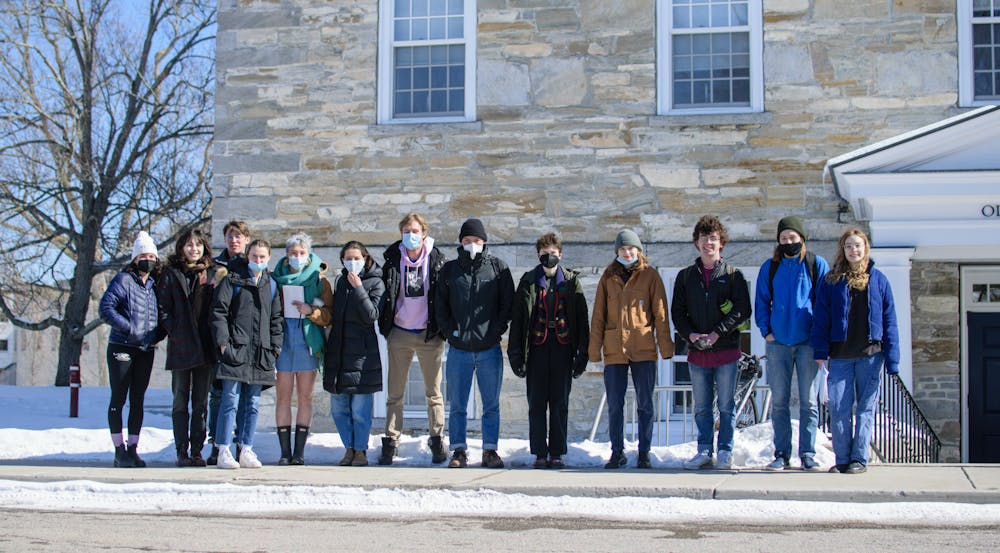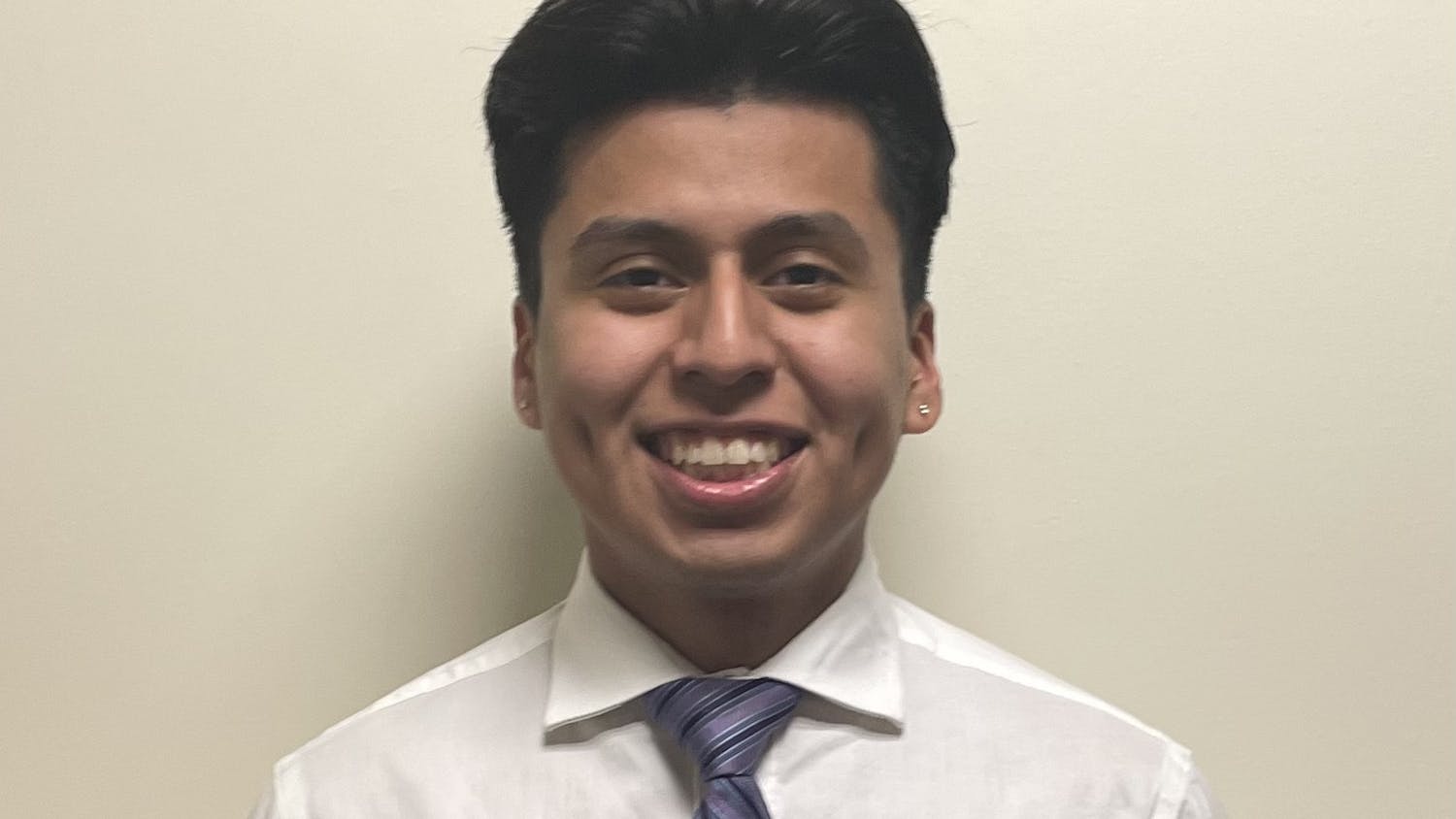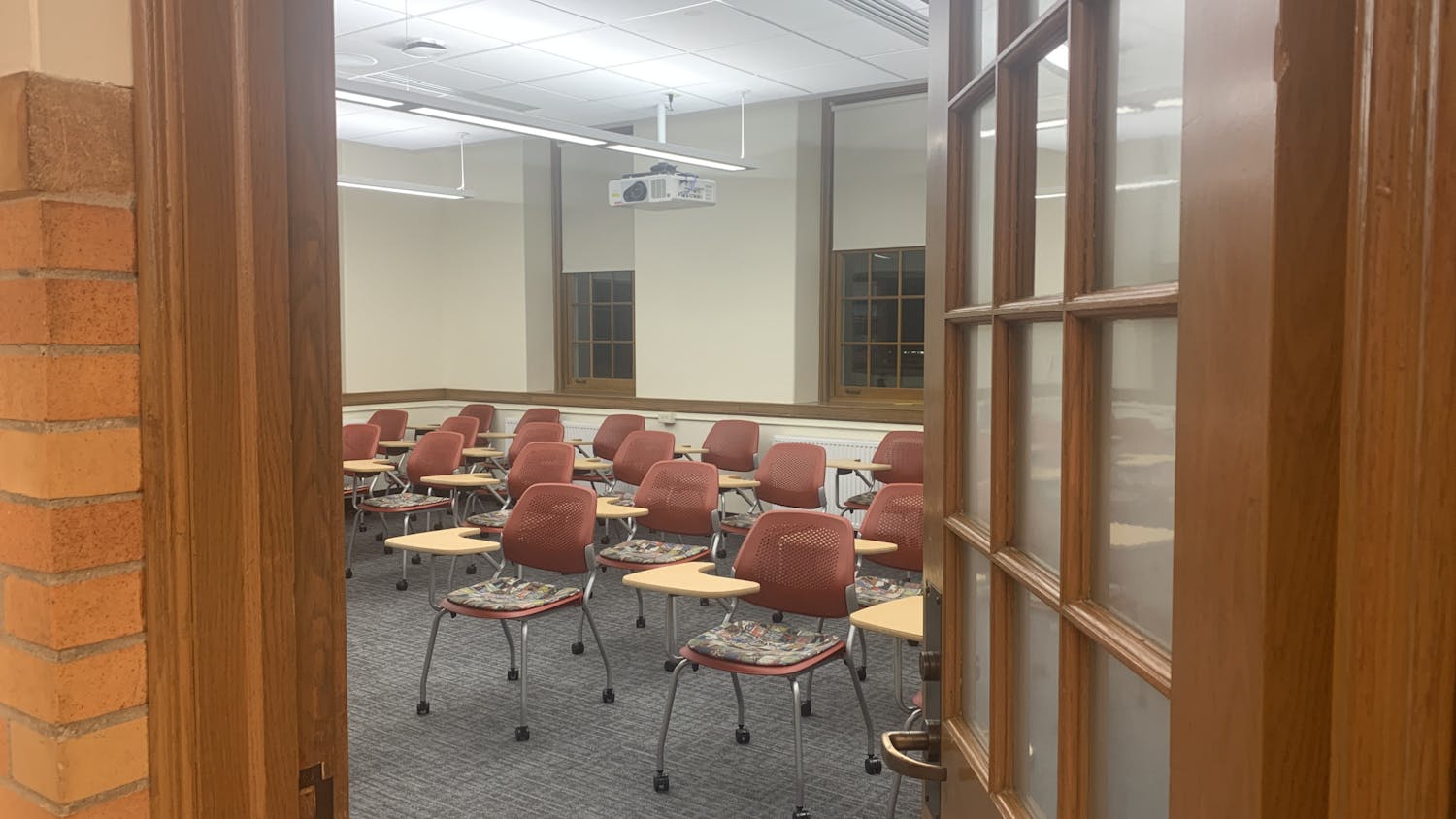Update, 6 a.m. March 17: Lana Povitz told The Campus on Friday, March 11 that she had signed a contract for a tenure-track position in the History Department, starting this July. Read our full coverage of the update here.
After more than three years at Middlebury, Visiting Assistant Professor of History Lana Povitz may be leaving the college — but not if a group of student organizers has anything to do with it. Povitz, whose partner is also a professor at the college, recently received a tenure-track offer from the University of Montreal. She is hoping that the college will match this offer with a tenure track position through the partner hire process. Current and former students of Povitz’s have organized a website, a demonstration and op-ed over the past week in support. Povitz and the student organizers want the college to match her other tenure-track offer before Wednesday, March 9, when she must provide an answer to the other university.
Povitz originally came to Middlebury on a one-year visiting contract. This was followed by another one-year contract, then a three-year contract, of which she is currently completing the second year. Because of her status as a visiting professor, she has had to constantly remain on the job market, and recently received the tenure-track offer from Montreal to be their U.S. historian. After receiving word of this offer in late February, Povitz contacted the History Department and Dean of Faculty on Monday, February 21, notifying them of the offer. Povitz’s partner Dima Ayoub, assistant professor of Arabic and C.V. Starr Junior Faculty Fellow in International Studies, put in a request to the administration for partner hire, a process by which professors or candidates may seek hiring for their spouses and partners.
Current and former students heard of the situation, and the deadline, and started organizing in support of Povitz.

Student organizers gather outside of Old Chapel on Friday, March 5, preparing to deliver letters in support of Professor Lana Povitz to administrators.
“This is not the first time [Ayoub] has gone to the administration with this request but we hope that this time, with student support, we will be successful,” Povitz said.
A visiting professorship is less appealing because of the lack of job security, and it also entails other disadvantages, such as the lack of opportunity to take a sabbatical, or paid research leave.
Student support for Povitz has taken many forms over the last week. Kristen Morgenstern ’24, an advisee of Povitz’s, sent an email to all of the professor’s former students and all history majors and minors on Friday, February 25, alerting them to the situation and asking students to submit testimonials in support of Povitz by “shar[ing] the ways that Professor Povitz has touched your life and has been an essential asset of the Middlebury community in the form of a letter.”
“As you have all taken courses with her in the past, you know how much she means to our community, and losing her would be a great disservice to the progress of this institution,” Morgenstern wrote in the email.
By the following Tuesday, March 1, a website was launched sharing the more than 50 letters submitted by students, alongside more formal letters, including one from the Jewish community at Middlebury and another from Rabbi Danielle Stillman.
The student testimonials are divided into different categories of Povitz’s influence: Professor Povitz’s Courses, History Department and Advising, Building Jewish Community and Supporting Queer Students.
“I know my positive experience from Professor Povitz’s classrooms is not unique. Any student who takes one of her classes leaves with a greater understanding of marginalized histories and in my case, a greater sense of Middlebury community,” one testimonial reads.
“Professor Povitz has been one of my most impactful professors at Middlebury,” reads another. One student even describes choosing to come to Middlebury after sitting in on one of Povitz’s classes during preview days.
On Thursday, March 3, an op-ed addressed to President Laurie Patton and written by current and former students Cara Levine ’20, Eloise Berdahl-Baldwin ’21.5, Morgenstern, Remi Welbel ’22.5 and Yardena Gerwin ’22.5 was published in The Campus.
“The time is now for Middlebury to recognize the precious investment Professor Povitz has made in us by fully investing in her. President Patton, you have an opportunity to leave a tremendous legacy here at Middlebury by supporting the student-led initiative to keep Professor Povitz,” it reads.
The student organizers, supporters and op-ed authors all stress Povitz’s value to the course offerings available at the college.
“Lana teaches classes about social movement history, and the legacies of resistance, and that work should not only fall on faculty of color,” Cara Levine ’20, a former student of Povitz’s and an author of the op-ed, said. “She’s a white person teaching Black feminism. That’s valuable, because [the college] shouldn’t have to rely only on their faculty of color to teach courses that critically engage with the history of race and resistance in this country.”
The op-ed also argues for Povitz’s value to the Jewish community on campus, citing an informal Jewish text study group she oversaw and her involvement in Hillel.
Morgenstern emphasized how important Povitz’s presence at the college is for queer students, Jewish students and others. “Her being here is so meaningful,” she said.
Povitz is unlikely to remain at Middlebury without a tenure track offer, a faculty position that offers long-term job stability. According to Povitz, the History Department applied for a five-year visiting position for her back in January, before the Montreal offer. That application, she said, is still pending in the Educational Affairs Committee (EAC), a group of elected faculty members who make staffing recommendations to the Provost, which are typically adopted. However, receiving a tenure track offer from another institution would likely draw her away from Middlebury. Povitz said that she loves teaching, but is also passionate about research and working on her current book project, a biography of feminist activist and writer Shulamith Firestone. “As a contingent faculty member, I don’t have the same opportunities as my colleagues to devote time to scholarship,” Povitz said.
A central issue of the student campaign is a lack of a partner hire offer. Because of Middlebury’s remote location and the absence of nearby academic institutions, and because academics are often married to other academics, a lack of spousal or partner hire can be a dealbreaker for prospective faculty. Povitz’s partner Ayoub is a woman of color, and one goal of partner hiring is to retain faculty of color, something the college has both historically and recently struggled to do.
“It’s a bigger ask from the school for someone to come to this predominantly white state to live in the middle of nowhere when they don’t have the people that they love with them,” Levine said. “So anything that the college can do to make that easier is really important.”
Individual faculty who are making a partner inclusion request will contact the Dean of Faculty, who connects them with the relevant departments to solicit departmental interest in the potential hire, according to Dean of Faculty Sujata Moorti.
There is no official partner hire policy for faculty positions, according to Provost Jeff Cason, nor is there any additional funding for partner hires. “Any decision to approve a partner hire comes out of the regular faculty [full time equivalent] budget,” he said.
Cason explained that there will typically be one to three requests for partner-related faculty hire, either for visiting or tenure-track positions, in a year. According to Cason, it is the EAC that receives the partner-related faculty position requests, and makes those recommendations to the Provost, who decides whether or not to accept them, and “considers them in light of curricular needs, institutional priorities and Middlebury’s strategic goals,” Moorti explained.
Beyond being a general recruitment method, partner hire can also be a tool in diversifying the faculty and staff at Middlebury. In the college’s September 2020 “Action Plan for Anti-Racism, Diversity, Equity, and Inclusion” the second strategy listed under Recruitment and Hiring heading in the Faculty and Staff section is, “Explore funding options to support partner hires and post-doctoral residencies,” a strategy assigned to the Dean of Faculty office with a 2022–23 implementation timeline. The college Human Resources department hired a partner inclusion specialist, Susan Edwards, just this past February; the listing for the job, before the position had been filled, describes the first responsibility of the role as, “Identify and advocate for academic and non-academic partner employment at the college.” Moorti clarified that Edwards will work to make opportunities for partners in the area, but that her role is to share information, not hire partners.
Moorti said that as part of the college’s DEI efforts, the college has worked with the EAC over the last two years to offer partners and spouses multi-year visiting positions, tenure-track positions, lab instructor positions, single courses, and winter term and Language Schools teaching opportunities.
David Miranda Hardy, associate professor of Film and Media Culture and a member of the faculty Committee on Diversity, Equity, and Inclusion, spoke about lack of transparency around the partner hire process, leading faculty to wonder why one partner hire might occur while another doesn’t. Miranda Hardy clarified the value of departmental independence in hiring, and prescribed an institution-wide solution to current issues around partner hire: clear transparent policy and the allocation of funds.
“There needs to be an explicit commitment, institutionally, to the recruitment and retention of minoritized faculty. And that means allocating resources,” Miranda Hardy said.
Partner hire can be used as a tool for drawing talent to the Middlebury area, but alternatively, a lack of partner hire can prevent professors from accepting jobs at the college. In February 2020, the Geology Department attempted to hire a new standout professor, even going so far as to delay their hiring process while she did fieldwork abroad. However, after weeks of negotiations, the prospective hire declined the offer because the administration was not able to provide a position for her partner, according to an email from Professor of Geology Dave West sent to geology majors at the time.
Student advocates for Povitz have claimed that partner hires have historically only been offered to straight couples. Povitz explained that she has never heard of a queer partner hire during her time at the college, nor spoken to anyone who can cite any examples. When asked whether this is true, Cason said that it would be inappropriate for him to answer because it concerns individual personnel decisions.
However, the lack of transparency around the partner hire process has led to doubt from Povitz and her student advocates about the success of requested partner hires.
“Because the College lacks a clear policy on partner hires, and because partner hires do seem to occur with some regularity, the question arises: Why does it happen for some people and not others? What does it take to be ‘worthy’?” Povitz said. “Although the College professes a commitment to retaining faculty of color, it’s not clear whether or how that commitment connects to retaining their partners.”
History Department Chair Jacob Tropp did not respond to an interview request. Povitz emphasized that the History Department has been supportive during her time at Middlebury, greenlit all of her courses and advocated for her in every way possible. She noted that the department has its own hiring priorities, and it is administrators who have the ultimate power in partner hires and retention of faculty of color.
All requests for faculty positions, including those related to partner hire, the conversion from visiting to tenure track and new faculty, come from departments. The Dean of Faculty can make recommendations, but departments ultimately decide which positions to pursue and request to the EAC. Departmental considerations are governed by factors like enrollment pressures and curricular goals.
The students working to keep Povitz at Middlebury are not unprecedented in their action.
As a student, Jay Saper ’13, who taught a winter term course this year, led a successful effort to get Tara Affolter, then a visiting professor in the Education Studies department, another three-year visiting position Middlebury. He, much like Povitz’s advocates, created a website with student testimonials and published an op-ed in The Campus. Following the student push, Affolter received another three-year visiting offer, at the end of which she applied for a tenure-track position in the department, for which she was hired.
Saper, however, worked on a much longer timeline. When he discovered during the fall semester that Affolter’s three-year visiting professorship would end with the 2011 spring semester, he began efforts to keep her around, including meeting with administrators, then-President Ron Leibowitz, starting the website and publishing the op-ed. Povitz’s supporters have had less than two weeks to make their case.
Saper applauded the efforts of current student advocates, and pointed out that we often forget about the role that past student organizing has had on the current state of the college.
“So much we take for granted in the world is the result of community organizing,” Saper said. “Middlebury College is no different. Student-led campaigns have always been integral to making our campus community a better place.”

Morgenstern (center) delivering letters to administrators.
After compiling more than 50 letters from students, Morgenstern decided that it would feel more tangible and meaningful to hand in their letters in person. She had already sent a letter by email to the History Department, Moorti, Cason and Patton and received no responses.
“Sending the administration a link to our website, they don’t have to look at it, but if we send our letters in person, they have to read them, or at least know that we were there,” she said.
The organizers decided that it would be more meaningful if a group delivered the letters, and Morgenstern sent out another email calling on Povitz’s former students and history majors to show up to the letter delivery.
On Friday, March 5, a group of more than a dozen students gathered outside of Old Chapel. Morgenstern held packets of the printed testimonials from Povitz’s advocates. Morgenstern addressed the gathering of students before heading into Old Chapel.
“Professor Povitz has meant so much to students here,” she said.
Joan Vera ’22, who has taken three classes with Povitz, was at the demonstration. Vera, who is not a history major, said that Povitz has the ability to reach students across disciplines, and teaches courses on important areas of marginalized histories.
The student organizers entered Old Chapel in search of Vice President for Student Affairs Smita Ruzicka, Moorti, Cason and Patton. In many cases, they were only able to access their administrative assistants, whom they provided with the packets of letters. Many of the administrators were in meetings at the time, owing to a remote convening of the College Board of Advisors, part of the Board of Trustees.

Connor Wertz '22 (right) addresses Provost Jeff Cason (left).
Organizers were able to reach Cason in his office while he was mid-meeting, where they told him about the importance of matching Povitz’s offer. They also asked that the college be more transparent with students about actions and decisions around Povitz’s employment.
Morgenstern handed Cason the packet of letters, and told him, “Whether you choose to read them or not, just know that you are hurting the community.”
Cason told the students that “a lot is happening in terms of trying to keep Professor Povitz,” and said that the college is aware of the deadline for Povitz’s other job offer.

Morgenstern addresses Cason.
The students also spoke with Executive Assistant to the President Stephanie Neil, who informed them that Patton was in a Trustee meeting and could not see them. The student demonstrators noted that if they are unable to secure a meeting with Patton by the start of the next week, they would return in similar fashion.
After the demonstration, Morgenstern did receive an email from Moorti, agreeing to set up a meeting with herself, Cason and the student organizers.
Throughout this entire process, Povitz maintains her desire to stay at Middlebury and her love for the college’s work environment.
“I just want to emphasize how much I adore this job, my students and my colleagues,” she said. “And of course my students are so special to me — your curiosity, sense of humor, work ethic, commitment to changing the world for the better and general openness to exploring new ideas gives me a lot of energy. I would really miss everyone if I left.”
Correction: A previous version of this article incorrectly stated that Professor Tara Affolter received a tenure-track offer following student activism. She actually received a three-year visiting contract, and later applied for and received a tenure track position. The error has been corrected.

Riley Board '22 is the Editor in Chief of The Campus. She previously served as a Managing Editor, News Editor, Arts & Academics Editor and writer.
She is majoring in Linguistics as an Independent Scholar and is an English minor on the Creative Writing Track.
Board has worked as a writer at Smithsonian Folklife Magazine and as a reporter for The Burlington Free Press. Currently, she is a 2021-2022 Kellogg Fellow working on her linguistics thesis. In her free time, you can find her roller skating in E-Lot or watching the same sitcoms over and over again.




